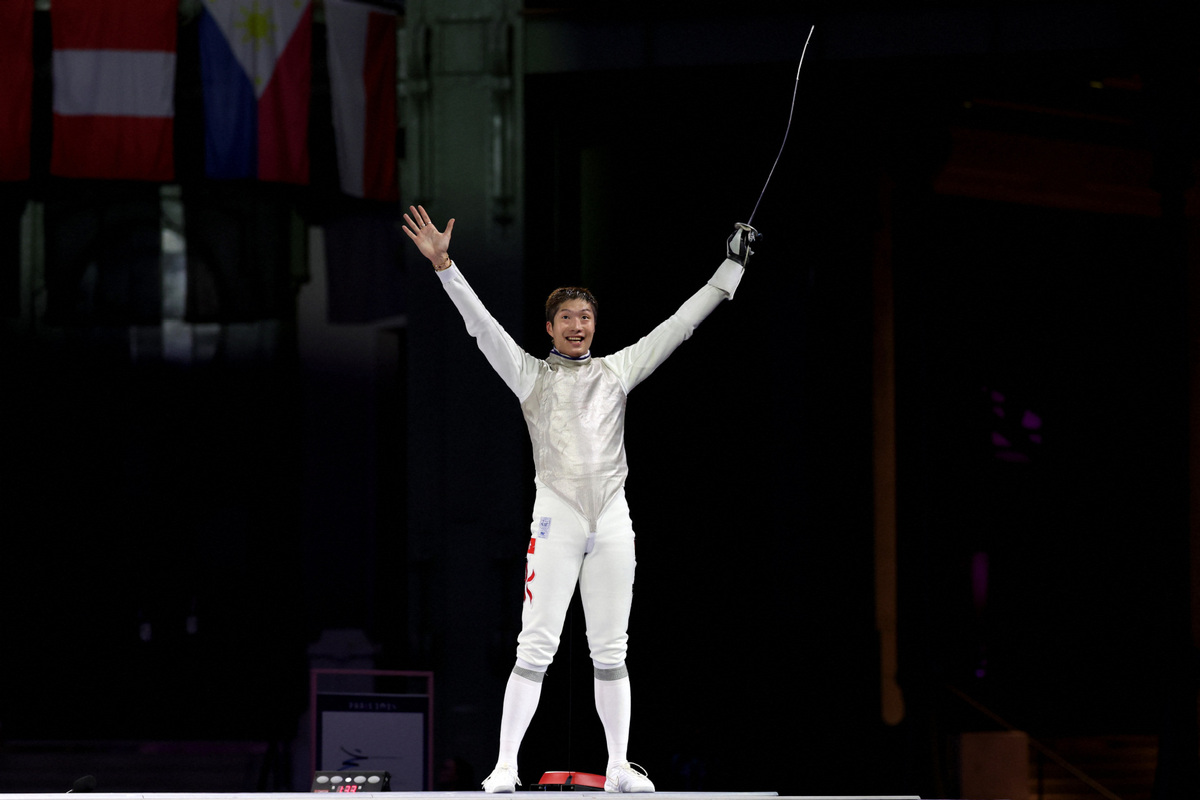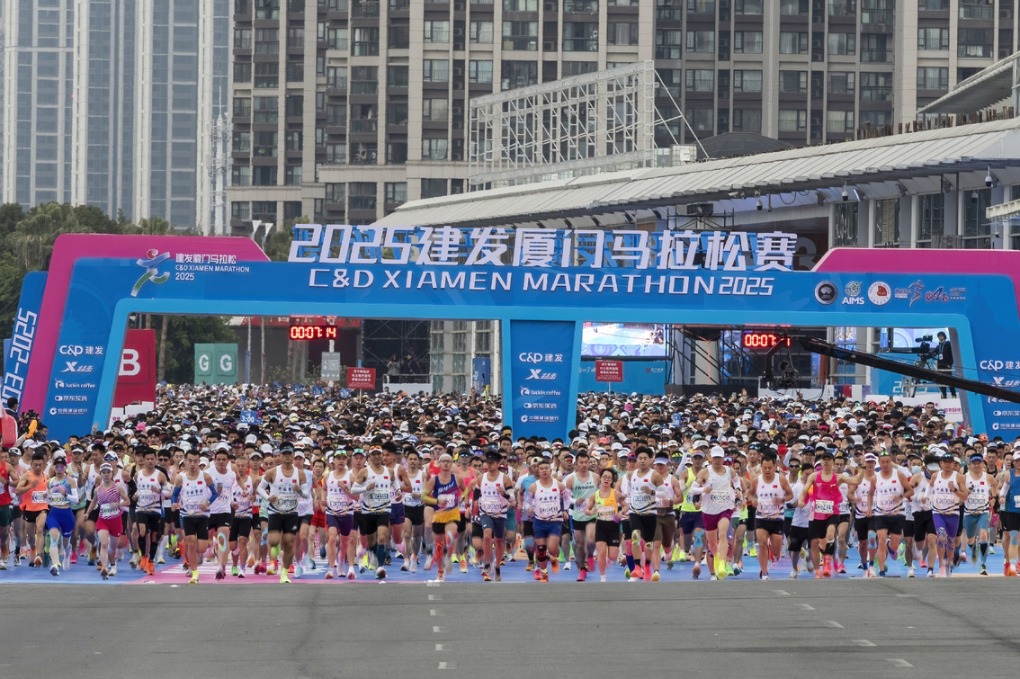From a boy to a swordsman
Maturity and experience help Hong Kong's Cheung win historic second Olympic fencing gold


Two years ago, in a quandary following his gold medal win in the men's individual foil at the Tokyo Olympics in 2021, Edgar Cheung Ka-long watched Michael Jordan's documentary The Last Dance for a second time to learn how the legendary basketball player sustained his drive.
"The conventional path to win a championship involves striving for a very long time, but I achieved this goal relatively early, so what should I strive for next?" the Hong Kong champion fencer told local media at the time.
Ultimately, he discovered the answer — to continue winning. Two years later, at the Paris Olympics, 27-year-old Cheung successfully defended his men's foil individual title on Monday.
This gold medal is the second for the Hong Kong, China team at this year's Olympiad. It also distinguishes Cheung as the first athlete in Hong Kong's history to successfully defend an Olympic gold medal, and the first to secure two. Also, as the last instance of a fencer successfully defending the Olympic men's foil title dates back to 1956, this medal made Cheung the first athlete in 68 years to achieve such a feat.
Following Cheung's victory, his French coach, Gregory Koenig, highlighted the additional significance of the gold medal: it symbolizes the journey of how a young boy evolved into a mature hero.
"Three years ago, he (Cheung) was a fearless boy. Today, he has transformed into a man," Koenig said.
Koenig recalled vivid memories of Cheung's state of mind before the Tokyo Olympics.
At the time, when confronted with defeat, Cheung would experience moments of self-doubt. He visited Koenig's home, confiding that he felt a loss of joy in fencing, unsure of how to proceed, and questioning if he was suitable for the sport.
But, Koenig was convinced of Cheung's ability. Employing various methods, the coach supported Cheung. He encouraged and assured him that everything was well-prepared, he just needed "a good mindset". He even granted Cheung a weeklong break at a critical juncture to help him sort out his emotions. Cheung later described this break as having "saved his life".
With a revitalized attitude, Cheung emerged victorious. On the evening of July 26, 2021, at the Tokyo Olympics, he bested Daniele Garozzo, the Italian fencer who had previously secured the men's individual title at the Rio Olympics, with a score of 15-11.
The gold medal marked a significant moment in Hong Kong's history, becoming its second Olympic gold in 25 years, following the region's first Olympic triumph, in sailboarding, at Atlanta 1996.Beyond the sporting realm, the victory also acted as a morale booster for the city, lifting its spirits during a somber period following social unrest and the challenges posed by the COVID-19 pandemic.
A new term had even emerged in Hong Kong — the "Ka-long Effect".
Cheung became a household name among the city's 7 million residents. Advertisements featuring him adorned the streets. One of his alma maters named a classroom after him, making him the third alumnus to receive such recognition. Numerous fencing schools sprang up, and hordes of young people regarded Cheung as a spiritual beacon.
According to local media reports, Cheung took time to process the sudden change.
Initially, he found it hard to accept. "I couldn't believe that I was an Olympic champion; I was bewildered by the situation."
Subsequently, he gradually embraced his new identity. He acquired the ability to decline public appearances that didn't resonate with him, select endorsements judiciously, and graciously interact with fans who asked to take photos together.
But, more importantly, Cheung understood how to discern what truly matters amidst various temptations and voices — his passion for fencing.
Cheung's family background is rooted in basketball, as both his father and mother were professional basketball players. Initially, his family encouraged him to pursue basketball, but Cheung's passion for fencing blossomed when he began learning the sport at the age of 10. During middle school, Cheung wanted to become a full-time fencer, which was opposed by his family. Cheung didn't give up. He spent a year persuading his family, and eventually they backed down.
It was that passion for fencing that propelled Cheung to continue after his Tokyo success. Over the next three years, Cheung won many competitions, including the Asian Games in Hangzhou in 2023, the 2024 Grand Prix in Turin, Italy, in February, and another Grand Prix in Shanghai in May.
Throughout this period, Cheung also honed his ability to cope with failure.
In the lead-up to the Paris Olympics, Cheung faced setbacks similar to those preceding the Tokyo Olympics. June's 2024 Asian Fencing Championships in Kuwait concluded with him exiting the individual competition in the round of 16 and finishing the team competition in fourth place.
However, compared to previous years, Cheung approached these challenges with greater resilience. Cheung acknowledged that the defeat was a "hit" for him, yet it served as a reminder that he should "give his all in every match and approach each fencing bout with determination".
In a June interview talking about his preparations for the Paris Olympics, he stated calmly, "I am not overly concerned about defending the title. My focus is on performing at my best without placing excessive pressure on myself.
"When I was young, I was really emotional, but as I grew older, I learned to recognize and adjust to this aspect, perhaps due to gaining more experience, or perhaps, I just grew up."
On Monday, during the final of men's foil at the Paris Olympics, Cheung faced off against the Italian fencer, Filippo Macchi. The competition saw Cheung trailing 12-14, before leveling the score to 14-all. In three decisive moments, Cheung clashed with his opponent and won the crucial point, ultimately securing victory with a score of 15:14.
Koenig said Cheung's exceptional mental fortitude was a pivotal factor in his gold medal win, adding, "You can't believe how strong his heart is."
What's more, after this victory, Cheung is not as bewildered as he was after his win in Tokyo. Facing the media, he affirmed his determination to secure another World Championship title. "I will persist in my efforts to create more milestones in my professional journey, with my next aim set on achieving the Grand Slam."
Most Popular
- Fallen soccer giants signal end of China's big-spending era
- Pistons tame Wolves despite Edwards' heroics
- City shows a bit more Pep with successive wins
- Arteta aghast at Brighton penalty as Gunners misfire
- A marathon year for Belgian amateur
- As life without Butler begins, Heat fails to ignite






























